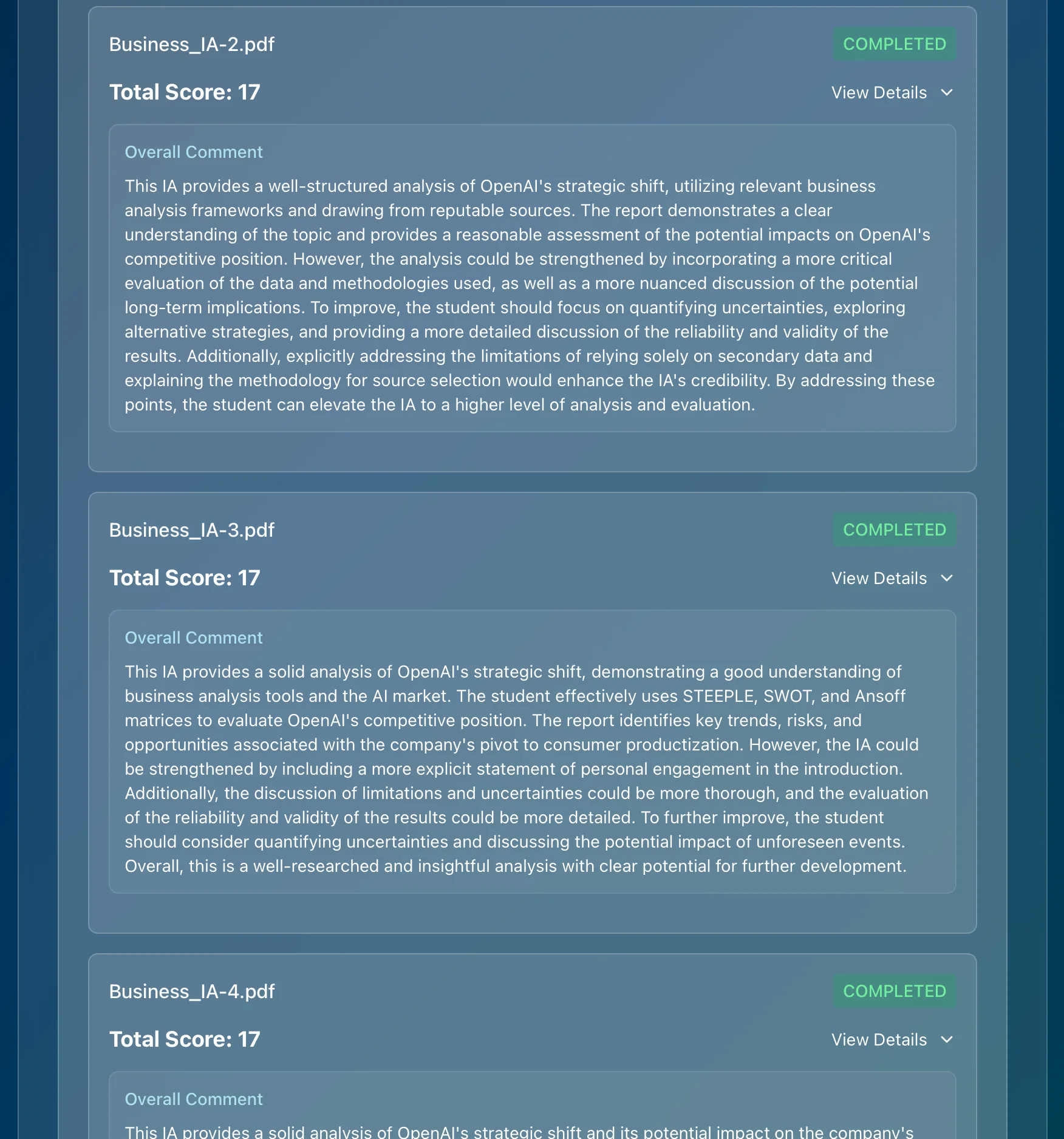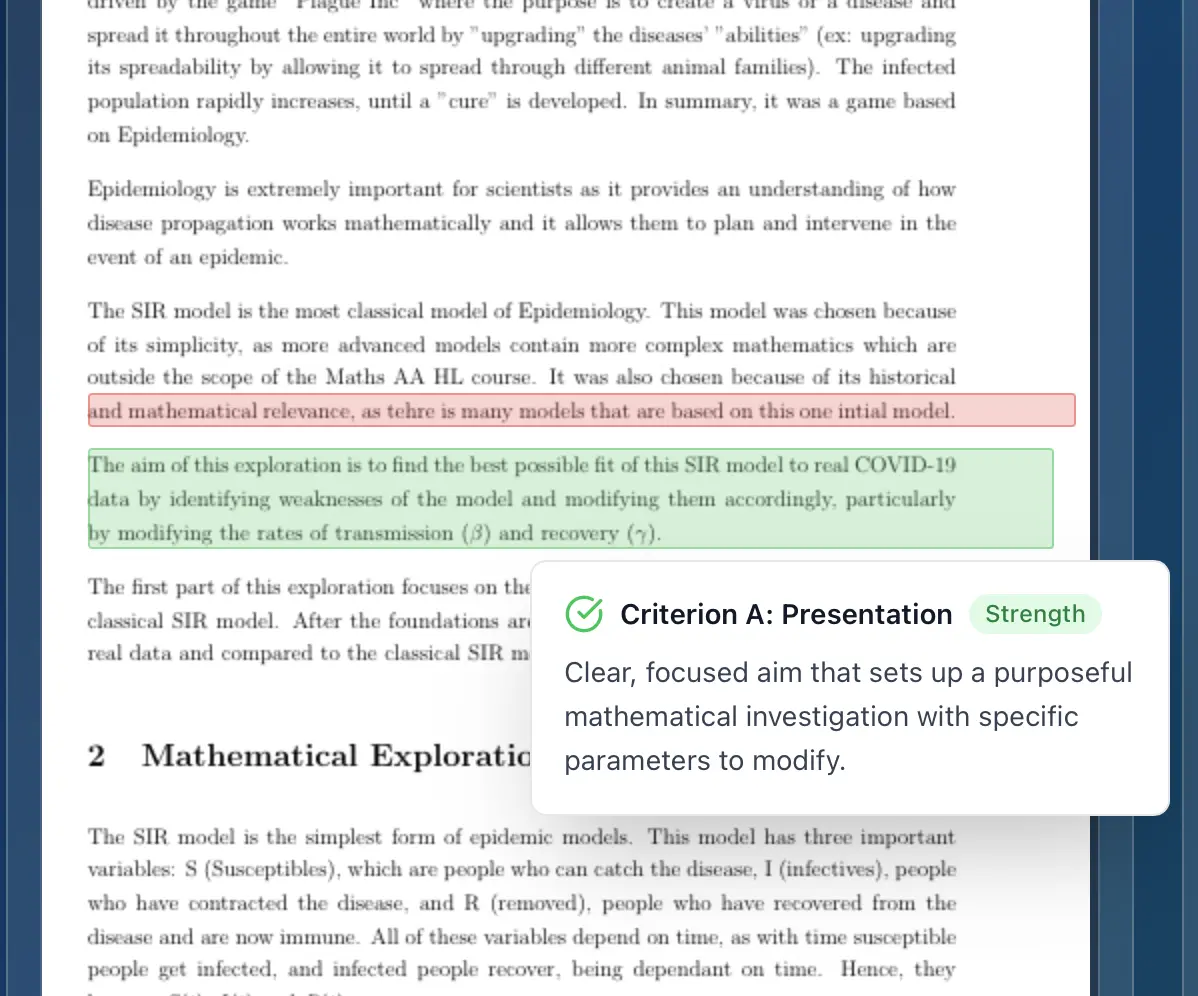Does Your IB Score Matter? How Universities View Your Diploma
Yes, your IB score matters significantly when applying to universities. Universities worldwide recognize the International Baccalaureate (IB) Diploma Programme as a rigorous and comprehensive pre-university qualification. Your final IB score, out of a possible 45 points, is a key factor in the admissions process, alongside your predicted grades, Internal Assessments (IAs), and overall academic profile. This blog post will delve into how universities view your IB diploma, the importance of achieving a good score, and strategies to maximize your chances of acceptance. We'll also explore how tools like AI grading assistants can help you and your teachers navigate the complexities of IB assessment.
Understanding the IB Diploma and Its Value
The International Baccalaureate (IB) Diploma Programme is a challenging two-year educational program for students aged 16-19. It aims to develop inquiring, knowledgeable, and caring young people who help to create a better and more peaceful world through intercultural understanding and respect. The IB curriculum is known for its breadth and depth, requiring students to study six subjects, complete an Extended Essay, participate in Theory of Knowledge (TOK), and engage in Creativity, Activity, Service (CAS).
Universities value the IB Diploma for several reasons:
- Academic Rigor: The IB curriculum is demanding and prepares students well for the challenges of university-level study.
- Holistic Education: The IB emphasizes not only academic achievement but also personal development, critical thinking, and global awareness.
- Standardized Assessment: The IB uses a consistent and internationally recognized grading system, allowing universities to compare applicants from different countries and educational backgrounds fairly.
- Well-Rounded Students: The combination of subjects, the Extended Essay, TOK, and CAS ensures that IB graduates are well-rounded individuals with a range of skills and experiences.
Struggling with IB Assessments?
Get instant, detailed feedback on your work with AI that understands IB criteria.

How Universities Evaluate Your IB Score
Universities consider your IB score in the context of your overall application. They look at:
- Final IB Score: This is the most important factor. Each university has a minimum IB score requirement for admission. Competitive universities often require scores of 38 or higher.
- Subject Grades: Universities may have specific subject requirements for certain programs. For example, a student applying to engineering might need a strong grade in IB Physics and Mathematics.
- Predicted Grades: Universities use predicted grades to assess your potential before you receive your final IB results. Predicted grades are based on your performance in class, mock exams, and Internal Assessments.
- Extended Essay and TOK: A strong Extended Essay and TOK grade can boost your application. These components demonstrate your research skills, critical thinking abilities, and intellectual curiosity.
- Overall Academic Profile: Universities also consider your high school transcript, extracurricular activities, and letters of recommendation.
What's a "Good" IB Score? Target Scores for Top Universities
What constitutes a "good" IB score depends on the universities you are targeting. Here's a general guideline:
- 30-35: May be sufficient for some universities, particularly those with less competitive admissions.
- 36-38: A solid score that opens doors to a wider range of universities.
- 39-41: A very competitive score that makes you a strong candidate for top universities.
- 42-45: An exceptional score that puts you in a highly competitive position for the most prestigious universities.
It's crucial to research the specific IB score requirements for the universities you are interested in. Many universities publish their average or minimum IB scores for admitted students on their websites.
Example:
- University of Oxford: Typically requires a score of 38-40, with 7,6,6 at Higher Level.
- Harvard University: Does not publish a minimum IB score, but admitted students typically have scores in the 40-45 range.
- University of Toronto: Requirements vary by program, but a score of 36 or higher is generally competitive.
Strategies to Maximize Your IB Score
Here are some actionable strategies to help you achieve a high IB score:
- Start Early: Don't wait until the last minute to start studying. Begin reviewing material and completing assignments from the beginning of the IB program.
- Develop a Study Schedule: Create a realistic study schedule that allocates sufficient time for each subject.
- Focus on Your Weaknesses: Identify your areas of weakness and dedicate extra time to improving them.
- Practice Past Papers: Practicing past papers is one of the most effective ways to prepare for IB exams. It helps you familiarize yourself with the exam format, question types, and marking schemes.
- Seek Help When Needed: Don't hesitate to ask your teachers, classmates, or tutors for help if you are struggling with a particular topic.
- Master Internal Assessments: Internal Assessments (IAs) are a significant component of your overall IB score. Start working on your IAs early and seek feedback from your teachers.
- Time Management: Practice effective time management skills to ensure you can complete exams within the allotted time.
- Stay Organized: Keep your notes, assignments, and resources organized to make it easier to study and review.
- Take Care of Yourself: Get enough sleep, eat a healthy diet, and exercise regularly to maintain your physical and mental well-being.
Pro Tip: Get AI-Powered Grading
Stop second-guessing your grades. Get instant feedback aligned with official IB rubrics.

Common Challenges and Mistakes in IB Assessment
Many students face challenges in IB assessment. Here are some common pitfalls and how to avoid them:
- Procrastination: Delaying assignments and studying until the last minute can lead to stress and poor performance. Solution: Break down large tasks into smaller, more manageable steps and set realistic deadlines.
- Poor Time Management: Struggling to complete exams within the allotted time can result in lost marks. Solution: Practice time management techniques and complete practice exams under timed conditions.
- Lack of Understanding of Assessment Criteria: Not fully understanding the assessment criteria can lead to submitting work that does not meet the requirements. Solution: Carefully review the assessment criteria for each subject and seek clarification from your teachers if needed.
- Neglecting Internal Assessments: Underestimating the importance of Internal Assessments can significantly impact your overall score. Solution: Start working on your IAs early, seek feedback from your teachers, and allocate sufficient time to complete them to a high standard.
- Failing to Seek Help: Being afraid or reluctant to ask for help when struggling with a topic can hinder your progress. Solution: Don't hesitate to ask your teachers, classmates, or tutors for assistance.
- Not Using Feedback Effectively: Ignoring feedback from teachers on assignments and assessments can prevent you from improving your performance. Solution: Carefully review feedback and use it to identify areas for improvement.
Advanced Tips and Strategies for IB Success
Beyond the basics, here are some advanced strategies to help you excel in the IB program:
- Develop Critical Thinking Skills: The IB emphasizes critical thinking, analysis, and evaluation. Practice these skills by questioning assumptions, analyzing arguments, and forming your own opinions.
- Engage in Independent Research: Go beyond the textbook and explore topics in greater depth through independent research. This can help you develop a deeper understanding of the subject matter and improve your research skills.
- Participate in Discussions: Actively participate in class discussions and debates. This can help you develop your communication skills, learn from others, and deepen your understanding of the material.
- Connect with Alumni: Reach out to IB alumni who have attended the universities you are interested in. They can provide valuable insights and advice on the application process.
- Attend Workshops and Seminars: Attend workshops and seminars on IB-related topics to enhance your knowledge and skills.
- Seek Mentorship: Find a mentor who can provide guidance and support throughout your IB journey.
Technology and Modern Assessment: The Role of AI
Technology is transforming education, and IB assessment is no exception. AI-powered tools are emerging to assist both students and teachers in navigating the complexities of the IB program.
One of the most promising applications of AI in IB education is in grading and feedback. Marksy, for example, is an AI grading assistant specifically designed for the International Baccalaureate. It provides instant, accurate, and detailed feedback on student work based on official IB rubrics. This helps students understand exactly how to improve their work and allows teachers to save time and focus on providing personalized instruction.
AI grading tools like Marksy use official IB criteria to ensure accuracy and fairness. They can analyze student work and provide criterion-by-criterion feedback, highlighting strengths and weaknesses and suggesting areas for improvement. This level of detail can be invaluable for students who are striving to achieve a high score.
For teachers, AI grading assistants can significantly reduce the time spent on grading, freeing up valuable time for lesson planning, student support, and professional development. By providing consistent and objective feedback, AI tools can also help to ensure that all students are assessed fairly and equitably.
The use of AI in IB assessment is still in its early stages, but it has the potential to revolutionize the way students learn and teachers teach. As AI technology continues to develop, we can expect to see even more innovative applications in the years to come.
Conclusion: Your IB Score is a Stepping Stone
Your IB score is a significant factor in the university admissions process, but it's not the only factor. Universities are looking for well-rounded individuals with a passion for learning, strong critical thinking skills, and a commitment to making a positive impact on the world.
By focusing on your academic performance, developing your personal skills, and engaging in meaningful extracurricular activities, you can increase your chances of acceptance to your dream university. Remember to start early, seek help when needed, and utilize all the resources available to you, including AI-powered tools like Marksy, to maximize your potential.
Ready to take your IB preparation to the next level? Try Marksy for free today and experience the power of AI-driven feedback! [Link to Marksy Free Trial]